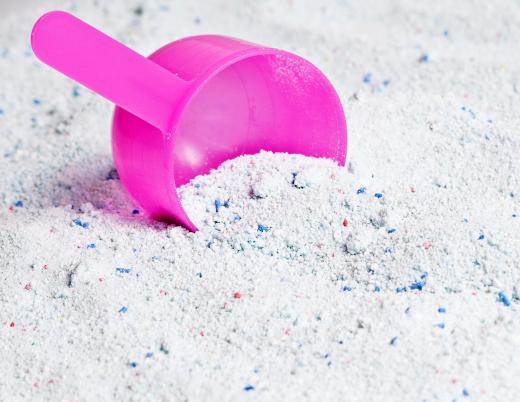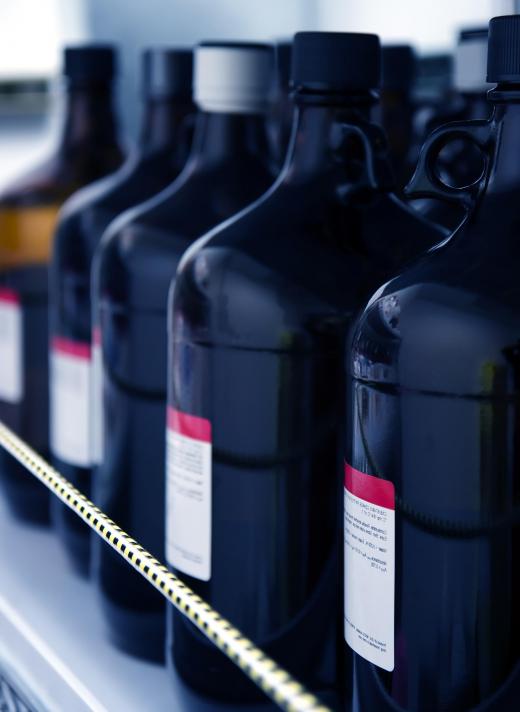What is Naptha?
 Mary McMahon
Mary McMahon
Naptha, also spelled naphtha, is a type of hydrocarbon that is produced through a distillation process. A major source of naptha is crude oil, which is processed in refineries to break down the chains of hydrocarbons. Coal tar also can be processed to yield this hydrocarbon, and it can be extracted from wood. There are many uses for naptha, including as a solvent in laundry soap or cleaning fluid. People have been using this compound for a long time; at least one culture, for example, used it in primitive grenades.
Terminology

There is some irregularity in how the word “naptha” is used. Historically, it was often used generally to refer to crude oil. The modern usage, however, refers to an array of hydrocarbons of different compositions that share some structural similarities. The word — usually using the spelling "naphtha" — is often seen in the names for other hydrocarbon compounds, illustrating the fact that it is often a component ingredient or base in hydrocarbon processing and production.
Varieties
This chemical is often categorized into one of two categories: aliphatic, or "light," and aromatic, or "heavy." Aliphatic compounds contain more of a chemical compound called paraffin. They are sometimes called paraffinic compounds.
Uses

One common use of this chemical is as a solvent. Naptha is a very strong and versatile solvent which can be used in hydrocarbon cracking, laundry soaps, organic chemistry, cleaning fluids, and many other applications. Fels-Naptha® is a particularly famous brand of soap that contains this chemical as a solvent. The product also is used to make varnish and to fuel camping cook stoves and lamps, as well as in the processing of fuels such as gasoline and kerosene.
Hazards

Some forms of this chemical can be dangerous. A few forms can cause cancer, and many of them cause skin irritation, stomach upset and other health problems when people are exposed to them. Naptha also is unstable and flammable, making it important for people to handle it with care. People who inhale or ingest it should see a doctor as soon as possible, and people who have experienced skin contact with it should shower well to reduce the risk of developing skin irritation.
Safety

Many refineries produce various forms of naptha. Each comes with its own material safety data sheet (MSDS) that provides specific information about its chemical composition, handling precautions, health risks and other characteristics. It is important for anyone who uses this chemical to read this information carefully so that he or she is as knowledgeable as possible before using the chemical. The MSDS also has information about what should be done if someone is accidentally exposed to the chemical or if another emergency situation arises.
AS FEATURED ON:
AS FEATURED ON:














Discussion Comments
Clothes catch fire? I would think if they survive the dryer, you'd be home free after that.
Can naphtha be used for magic purposes?
I'm a chemical student and want to get a knowledge of Aromatic solvents 100, 150, 200, 250 applications in industries.
Please guide in short which will help me to get brief knowledge on it.
@seag47 – My husband convinced me to buy naptha soap, because his mother had used it to remove stains from his clothing and it had worked so well. He has always worked in construction, so he has had some serious stains on his clothes before, but naptha removed them.
The bar is about as long as two bars of regular soap put together. I just tear off a bit of the wrapper at one end and rub the bar on the stains. That way, I don't have to touch it.
Yes, the warnings on the label were a bit scary. However, there are ways around touching the soap. Even if I do, it still works better than anything else I've tried at getting out stains, so I'm willing to risk a little irritation on the way to the sink to wash my hands.
Has anyone here ever used the naptha soap that comes in the form of a bar? I've heard good things about it, but I've also heard that you should wear gloves while handling it. So, it isn't for use on the skin, but it is for removing stains from clothes.
If it's really good at getting out stains, I will try it. If it doesn't work any better than the spray-on stain removers, I will stick to them, because I don't have to get them on my hands.
Should bottled fresh air be used when working on a tank that held this chemical? Or will a dinky little mask do the trick?
Fels Naptha does not have naptha in it.
"Considering that naptha can be such a dangerous chemical, it's kind of surprising that it is used in things like laundry soap."
It's not like you're pouring a gallon of naptha into your washing machine.
Did you know that Fels naptha soap can be used to treat and prevent poison oak, poison sumac, and poison ivy?
If you have the resin from these plants on your body, you can wash yourself with Fels naptha soap to remove the resin from your skin.
You can also use some of the soap when washing your clothing that has the resin on it, because regular laundry detergent alone may not remove it. You wouldn't want to get poison oak, sumac, or ivy again from leftovers on your clothes!
Considering that naptha can be such a dangerous chemical, it's kind of surprising that it is used in things like laundry soap.
Are all forms of naptha so flammable? And if so, does it retain this flammability once it is put into things like laundry soap? I certainly don't want to put anything on my family's clothing that could very easily catch fire.
Post your comments